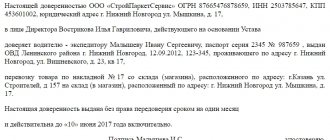Kinds
A power of attorney is a document that is issued to another person and allows him to perform certain actions.
In legal practice, the following types of this official paper are distinguished:
- general – gives the right to drive vehicles, rent and register them, dispose of them, buy or sell them;
- special - allows you to act only in one area: representation in court;
- one-time - awarded only for a specific action: to undergo a technical inspection.
ATTENTION! To issue an insurance policy, a special or one-time power of attorney must be presented.
What information is included in the power of attorney?
This official document should contain the following information:
- date of issue of the document. Without it it is invalid;
- first name, last name, patronymic name of the car owner and attorney;
- the full address of the owner of the car and the person for whom the power of attorney is drawn up;
- basic characteristics of the car;
- a list of actions that an attorney can perform.
IMPORTANT! If the validity period of the power of attorney is not specified, it is considered to be issued for one year.
The document will be terminated:
- the validity period has passed;
- the owner of the car died, was declared incompetent, missing;
- the company that owned the car ceased to exist.
This document can be legally canceled.
If the person is already included in the insurance
The person driving is required to present the following documents:
- driver license;
- car registration certificate;
- valid insurance.
That is, it is not necessary to present the power of attorney itself if the driver is included in the insurance.
But there are situations when this document will be needed, despite the entry in the car insurance policy. Such cases include:
- performing certain registration actions: registration, documentary changes;
- passing a technical inspection;
- representing the interests of the owner in the insurance company;
- sell, buy, leave a car as collateral;
- registration of compulsory motor liability insurance.
In these cases, the representative must have a notarized power of attorney.
Rules governing the revocation of a power of attorney
The principal has the right to revoke the power of attorney at any time. In this case, he must notify the authorized person, who must immediately return the document issued to him.
The power of attorney is considered invalid in the following cases:
- If the period for which it was issued has expired.
- If the person who issued it passed away.
- If this person has become incapacitated.
- If the person who represented his interests by power of attorney has died or lost his legal capacity.
- If the power of attorney is revoked by the principal.
- The authorized representative refused to use the power of attorney.
- The legal entity that issued the power of attorney was liquidated.
- The legal entity for which the power of attorney was issued was liquidated.
It is important to remember that if the owner of the car passes away, the latter becomes the property of the heirs , regardless of the form of power of attorney issued to him. If a person manages or disposes of a car by proxy, it is impossible to draw up a purchase and sale agreement for this vehicle. This should be taken into account by those who, representing the interests of the principal, plan to subsequently purchase a car from him, which they use by proxy.
There are situations when the power of attorney is terminated, but the term of the insurance contract has not yet expired. In this case, the agreement may be:
- terminated (by agreement of the parties);
- re-registered to the person who owns the vehicle.
The person carrying out the insurance also has the right to declare a person other than the one originally specified in the contract as an attorney. In this case, it is obliged to write a notification about this to the insurance company.
Thus, the advantages of using a power of attorney to represent interests are:
- Speed of document processing.
- An opportunity for the principal to resolve some of the property problems through a proxy. This allows him not to waste his own time and effort.
- The ability for the attorney to use the property entrusted to him in his own interests, in agreement with the owner of the property.
The disadvantages of using a power of attorney to represent interests are:
- The attorney does not have the right to transfer the property to himself.
- If the power of attorney is lost, the attorney's ability to use property (for example, a car) is lost. There is a need to contact the owner again.
- When an owner's property is seized, it is taken from the attorney.
- If an attorney uses property for criminal purposes, the owner of the property will have to prove his innocence in the crime.
Design pitfalls
When taking out an insurance policy, pay attention to the following points:
- companies and agents. Currently, there are many insurance companies and representatives who have entered into contracts with several companies at once. They offer discounts and bonuses. But such proposals are either insignificant or untrue;
- cooperation experience. Insurance agents offer discounts to regular customers;
- accident-free experience. For each safe year, the driver will receive up to a 5% discount when taking out a policy.
ATTENTION! The MTPL coefficient itself is set by the state.
An adult capable person who has a power of attorney from the owner can take out a compulsory motor liability insurance policy. At the same time, you don’t have to carry the power of attorney with you all the time if you have the basic package of documents for the car.
This type of power of attorney gives the representative the right to obtain a compulsory health insurance policy (CHI) or a car insurance policy (MTPL, CASCO). To obtain a medical policy, a one-time power of attorney is usually issued. OSAGO and CASCO policies are obtained primarily through a general power of attorney. As a general rule, a power of attorney must contain the date of execution and can be canceled by the principal at any time.
Power of attorney for obtaining medical insurance
Citizens of the Russian Federation have the right to free medical care, which is provided on the basis of a compulsory medical insurance policy. You can obtain an insurance policy from insurance companies. A power of attorney authorizes an attorney to represent the insured before the health care organization. The document is drawn up if a person cannot personally contact the insurance company. A power of attorney to obtain a compulsory medical insurance policy is drawn up in simple written form with the following details:
- Date of issue of the power of attorney.
- Place of compilation (city).
- Full name of the principal, passport details.
- Full name of the authorized person and his passport details.
- Powers delegated to the attorney (submitting documents to issue a policy, receiving a policy, signing documents).
- An insurance company in which a trustee can represent the interests of the principal.
- Signature of the principal.
- Expiration date (optional).
A power of attorney to obtain an insurance policy does not require notarization. Without a power of attorney, a policy for a child can be obtained by his parents or guardians. Since registration of the policy takes place in two stages, it is advisable to issue two copies of the power of attorney or make a copy of the original. It is also advisable to provide the authorized representative with a photocopy of the passport and pension insurance certificate in order to speed up the procedure for reconciling data when issuing a temporary certificate.
When receiving an insurance policy, the authorized representative must present a passport or other identification document and a power of attorney. In addition to documents, it is necessary to submit a photograph of the principal and his consent to the processing of personal data.
Registration of a power of attorney for the right to insure a car compulsory motor liability insurance
MTPL insurance can be obtained not only by the owner of the car. But also a person representing his interests. However, this type of power of attorney requires notarization.
It is possible to issue one of several options for such a power of attorney:
- One-time, issued for one-time use in a specific case.
- Special, giving the authorized person the right to perform repeated actions in a specific area. For example, driving a car or renting it out.
- General, upon registration of which, the attorney can freely manage and dispose of the vehicle mentioned in it.
In most cases, it is more profitable to issue a general power of attorney. It is usually recommended by insurance companies. Its advantages:
- it is possible to negotiate for the attorney the right to both insure the car and receive compensation in the event of insured events;
- It is possible for an authorized person to obtain the right, legally, to entrust the car to other persons.
The main points of the power of attorney for driving a vehicle:
- the place where the power of attorney is drawn up (city, region);
- date recorded in words;
- last name, first name and patronymic of the principal (if he is an individual);
- name of the principal (if he is a legal entity);
- last name, first name and patronymic of the authorized person (if he is an individual);
- name of the trustee (if it is a legal entity);
- principal's passport details;
- passport details of the authorized person;
- powers of the person;
- a reservation about the possibility or impossibility of their transfer;
- number, year of manufacture and the most important characteristics of the car;
- the period for which the power of attorney is issued.
Along with the power of attorney, the following documents are required to obtain insurance:
- Passports of the person in whose name the power of attorney is issued.
- A driver's license, or several licenses, of persons who will drive a car.
- A diagnostic card confirming that the vehicle has passed technical inspection.
OSAGO policy by proxy
To obtain an MTPL policy, you must present the following documents:
- Passport or military ID.
- Power of attorney.
- PTS, registration certificate, registration certificate or similar document.
- Copies of the driver's licenses of everyone who will be included in the insurance. If the policy is issued without restrictions, no certificates are needed.
- Previous MTPL policy on the basis of which discounts are made.
Not only the car owner can take out insurance. The policyholder can be the holder of a general or ordinary power of attorney. The insurance application is signed by a representative of the insurance company and the policyholder. Based on the application, an insurance policy is filled out. Pay attention to the date of issue of the power of attorney - if it is absent, the document has no legal force.
An individual on the premises of an insurance company can personally write a power of attorney for another person. The sample can be downloaded for free from this link.
The insurance company practices handling cases of road accidents by other entities on the basis of a power of attorney. An individual on the premises of an insurance company can personally write a document of trust for another person. Many insurance companies keep their own forms and samples of such documents in their archives. This resource page offers a sample power of attorney developed by our specialists. It can be downloaded for free via a direct link without restrictions and used in your own practice.
Let us consider the main features of a written act of expression of will. The name of the written sheet indicates that an individual who is unable to be personally present in a certain place entrusts this procedure to another person. The trust is recorded in writing in the presence of an agency employee, and in some cases, by a notary. The notarial form of execution of the trust deed is not critical. For example, Rosgosstrakh practices filling out its own forms and templates located at the organization’s stands.
Mandatory clauses of a power of attorney to an insurance company from an individual
:
- Title, place and date of writing;
- Passport details of both subjects;
- Specification of the institution where the individual’s trust is granted;
- List of powers allowed to be exercised;
- Duration of rights;
- Signature and decryption of the principal.
The content of the text must contain the listed powers to represent interests in a specific insurance company.
A person cannot perform actions that are not written down on paper. The discussed act of trust of the physical subject is filed in the materials of the case about the accident. There shouldn’t be any difficulties when you independently issue a trust document to an insurance company. The paper has the simplest paragraphs. Slowly filling out each item will create a document that has full legal force. Enjoy using it. On the territory of the Russian Federation, a power of attorney on behalf of the owner to drive a car by another person has been canceled, but it may be useful for carrying out some other actions with the vehicle. In what cases is there a need for this document?
The owner of a car does not always have the physical ability to independently take out a compulsory motor liability insurance policy or receive an insurance payment in the event of an insured event. In this case, he can transfer the corresponding powers to another person by issuing a power of attorney.
How to correctly draw up a power of attorney to represent interests in an insurance company
Each document, including a power of attorney for the implementation of several processes in insurance companies, requires correct completion so that insurance agency employees do not have unnecessary questions and difficulties. To avoid such troubles, there are certain requirements for formation, which you can find below:
- Entered the name of the current order and placed the inscription in the center of the sheet;
- Specified date of execution of the power of attorney;
- The specified locality in which this document is issued;
- Entered information about the principal's passport;
- Enter the necessary information for the future representative;
- In the case of a legal entity, enter the name of the institution, identification code and other information;
- Enter the address details of the insurer the attorney will contact;
- Clarify all delegated competencies;
- Indicate the validity period of the issued document;
- Allow or prohibit the right of subrogation;
- The presence of signatures of all participants in this document.
It should be noted that the legislation of the Russian Federation does not provide for a specific form for writing such a power of attorney, however, in order for such a warrant to subsequently serve as an official confirmation to protect the interests of a particular person in insurance companies, it is still recommended to follow all the rules for writing such documents.
The above conditions are not exhaustive, since you are allowed to edit this list and add your own items - it all depends on certain circumstances.
It should be noted that, according to the rules of Rosgosstrakh, a trust document that contains any unacceptable errors is not subject to consideration and will automatically be declared invalid. You need to understand that such errors primarily relate to the specified passport data in the document, that is, if they do not match, such a power of attorney will be considered incorrectly filled out and will not be considered under any circumstances. In addition, it is necessary to ensure legible handwriting, since the text on this paper must be completely readable. In order to avoid these nuances, it is highly recommended to draw up such a power of attorney in electronic form, that is, printed out on a printer.
( Video : “How to issue a power of attorney”)
Remember that in addition to Rosgosstrakh, all insurance institutions of the Russian Federation are also governed by these rules.
What documents need to be collected
Basically, such a trust document is certified directly on the spot. Therefore, it is necessary to remember that before this procedure you need to collect a certain package of documents that will be needed to certify this paper:
- civil passports of the principal and attorney;
- availability of an insurance policy;
- document confirming ownership;
- other registration documents for legal entities.
However, one should take into account the fact that this package of documents is not complete, since different insurers have the right to require additional papers to certify such a power of attorney.
What is a power of attorney and when might it be needed?
A power of attorney is an official document issued in writing by the owner of a vehicle to another (trusted) person, transferring to the latter the authority on behalf of the owner to perform certain actions with the car. Situations in which this document may be needed include:
- purchasing a compulsory motor liability insurance policy;
- changing data in the policy;
- receiving compensation from the insurance company after an accident;
- passing a technical inspection;
- sale of a vehicle;
- registration or deregistration of a car;
- driving away from the penalty area;
- travel by car outside the Russian Federation.
Note! In some cases, the power of attorney must be notarized (for example, in order for the policyholder or one of the drivers who is not the owner of the car to receive payments from the insurance company).
Types of powers of attorney for insurance under MTPL
A power of attorney for insurance under compulsory motor liability insurance can be issued in the following options:
- one-time;
- special;
- general
A one-time power of attorney is intended to assign to another person the authority to perform a specific single action, therefore such a document is relevant exactly until the specified operation is fully implemented. For example, such a document can be issued by the owner of the car to the policyholder to purchase a policy. A sample one-time power of attorney form can be downloaded from our website using the link.
According to a special power of attorney, its recipient can perform the same action for a longer period specified in the document itself (maximum three years). If such a period is not indicated in the text, it is generally accepted that the document is issued for one year. For example, a car owner can authorize the policyholder to renew the contract with the company and purchase a policy every year for three years.
A general power of attorney is issued if the car owner plans to entrust another person to carry out a range of operations with his car: insure the object, leave it as collateral, sell it, etc. Such a document must be certified by a notary office. A general power of attorney, if necessary, may also provide for the right to delegate the implementation of certain actions to third parties. The form for filling out a general power of attorney can be downloaded from the link.
Do I need to certify?
When answering the question about certification of a power of attorney at a notary’s office, it should be noted that some of them actually require a notary’s signature. Notarization is required for a document that deals with the right of subrogation. In all other cases, it is drawn up in the usual form and a notary’s signature is not required.
Note! To avoid problems with insurers who do not recognize powers of attorney without assurances, clarify the issue with the insurers in advance.
When issuing a power of attorney from a legal entity. The person's signature and company seal are affixed at the end.
Notarized power of attorney for representation of interests
How to issue a power of attorney for the right to sign, read here.
How to file a claim against an insurance company under compulsory motor liability insurance, read the link:
Procedure for registration and contents of the power of attorney
If the power of attorney does not require notarization, the car owner has the right to write it out in his own hand or prepare a printed version. To do this, you can compose the text yourself according to the rules of office work, using a ready-made form, or online, using the document designer.
A power of attorney that needs to be certified must be drawn up directly at a notary’s office and always in the presence of the principal. If necessary, the second party in whose name the power of attorney is drawn up can also be invited. Before going to the notary, you should prepare the required package of documents.
The list of documents required to issue a power of attorney includes:
- driver's license and car owner's passport;
- driver's license and passport of the person in whose name the document will be issued;
- documents for the car (technical passport, certificate of registration with the traffic police).
If the principal or trustee is a legal entity, then for registration you will need the registration documents of the organization and the passport of the official representative authorized to represent the interests of his company. Powers of attorney issued on behalf of an individual and a legal entity differ in the set of data specified in the text. Organizations can use their own letterhead as the basis for the paper.
The completed power of attorney must contain the following information:
- date of issue of the document and its validity period;
- Full name, date of birth, address, passport details of the owner of the car (for legal entities - organization details);
- Full name, date of birth, full address, passport details of the person in whose name the document is issued (for legal entities - details of the organization);
- a detailed description of the car indicating the make, model, VIN number, year of manufacture, body and chassis numbers, license plate, details of the state registration certificate;
- a list of operations that the authorized person is allowed to carry out;
- visa of the principal (for legal entities - and seal of the organization);
- visa and notary stamp (if necessary).
What operations can be performed to represent interests in an insurance company?
A power of attorney issued to a representative of its owner refers to standard legal documentation, according to which he can carry out all the procedures that were prescribed in it, namely, representing the interests of the principal in insurance institutions. The main such operations include the following processes:
- sign on behalf of the principal in the documentation that was specified in the text of the power of attorney;
- participate in insurance processes, including consideration of certain cases;
- receive all insurance payments related to damage compensation;
- draw up and cancel all agreements with insurers, as well as insure certain property.
All the above rights are, of course, not complete. In addition to these, there are other powers that are delegated to the attorney. Whatever they are, all such rights must be included in the text of the power of attorney. However, it is also necessary to ensure that all entered rights do not violate the current legislation of the Russian Federation. The attorney, in turn, can only perform those processes that are clearly stated in the text of the power of attorney. All documents that the representative has the right to sign must be specified in the trust document.
Do I need to get it certified by the insurance company?
Surely everyone knows that every citizen who issues a power of attorney for someone has every reason to notarize it, that is, to certify it. This is mainly done so that third parties do not have doubts about its authenticity in the future. In addition to certification, notaries of each office can directly help in drawing up a particular power of attorney or simply check the text for serious errors and, if necessary, edit it. Of course, all such actions are carried out by employees of a notary office for a certain fee.
In general, you need to take into account the fact that people who issue a power of attorney to represent their interests with insurers practically do not contact notary offices. Or they apply only in cases where this power of attorney implies the right of substitution.
Guided by the legislation of the Russian Federation, it can be noted that the principal does not need to include a notary certification at all. However, moments arise when insurance companies have some doubts related to this trust document, and subsequently they can simply reject it.
In order to avoid such situations, it is recommended to spend some time and get this paper certified. You need to pay attention to the fact that it is not necessary to contact a notary office, since the certification procedure can be completed at the insurance company itself. To implement these actions, you need to provide one or another company with an already prepared power of attorney.
After this, officials of the insurance institution sign the trust document and mark it with a special seal, which will further indicate the authenticity of this document. In addition, the principal is also required to sign, after which the document will be considered certified and accepted for consideration. It is not mandatory, but still recommended, that the signature of the authorized person be signed directly.
In order not to miss important nuances in drawing up a power of attorney to protect interests in insurance companies, it is advisable to clarify all important aspects with a particular insurer in advance.









